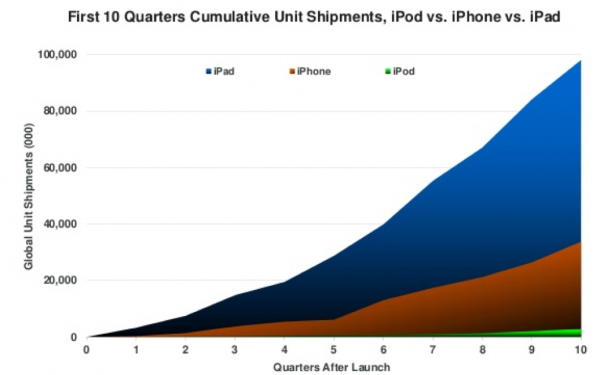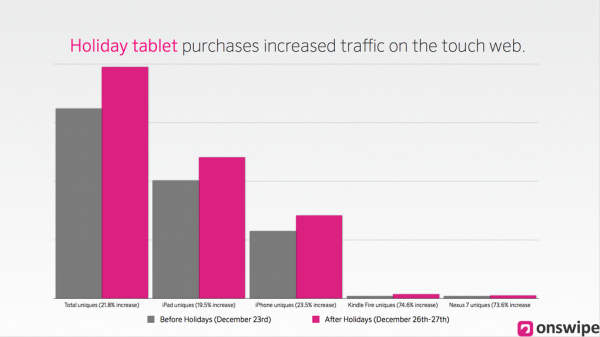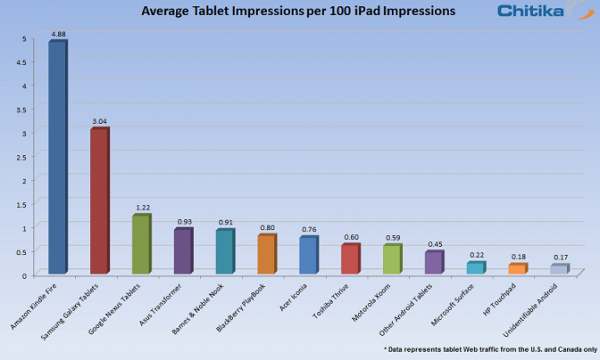If 2012 Was “The Year Of Mobile,” 2013 Will Be “The Year Of The Tablet”
After a year of massive growth in smartphone adoption nobody is questioning the importance of mobile anymore. Finally the tired conference joke, “Every year for the past ten years has been the year of mobile,” will be repeated no more (thank the lord). But even as marketers have yet to fully “get their heads around” […]

But even as marketers have yet to fully “get their heads around” the new reality of smartphone-powered consumer behavior they’ll have to contend with yet another form factor: tablets. No longer a novelty gadget, the tablet is now a mainstream computing device. Post-Xmas sales data will soon make that very clear.
If 2012 was finally, definitively “the year of mobile,” we’re likely to look back on 2013 as “the year of the tablet.”
PC sales to consumers in the US are flat or down as replacement cycles grow longer and tablets take the place of new PCs in many households. Accordingly many activities that took place on PCs in the past will increasingly happen (in the home) on smartphones and tablets. PCs are now just one of several internet devices and that’s likely to “get worse” over time.
The first iPad was introduced in Q1 2010, almost exactly three years ago. As the Mary Meeker slide above (using Apple sales data) indicates the growth and adoption of the iPad has been much faster than the iPod or the iPhone.
Asustek, the maker of the Android Nexus 7 tablet, told the Wall Street Journal in October that the company was selling nearly 1 million Nexus 7s a month. And while Amazon doesn’t release sales figures its Kindle Fire tablets were the top-selling electronics product on the site for many months and throughout the holidays.
Last week the Pew Internet & American Life Project reported that 33 percent of US adults either owned an eReader (e.g., basic Kindle) or a tablet (based on October survey data). According to multiple sources eReaders are giving way to the more versatile tablets. The bottom has all but dropped out of the eReader market.
The most desired electronics gift item this holiday season, for both kids and adults, was the iPad according to Nielsen survey data. And there’s considerable evidence that many people got what they wanted from Santa (or their parents if they’re Jewish).
Both Flurry Analytics and Onswipe reported big gains in tablet activations and activities on and after Xmas.
The chart above shows there was an overall increase of about 22 percent for iOS traffic and a 19.5 percent increase in unique visitors from iPads to Onswipe-powered websites. Among devices activated on Xmas, Flurry reported that 51 percent were tablets.
Currently it’s difficult to tell how many people in the US own tablets. If we extrapolate from the Pew data above we can estimate that roughly 62.5 million adults owned a tablet before Xmas. It’s not unreasonable to speculate that after holiday 2012 there could be something close to 90 million tablets in the US.
There are various estimates about the number of PCs in the US. Depending on the data source the numbers range from about 163 million to just over 200 million. In other words, in just three years, tablets have rapidly closed in on PC penetration.
By the end of this year, according to the above Mary Meeker slide (based on a mix of third party data), the installed base of smartphones + tablet should exceed PCs globally. That should also be true in the US by late 2013 or early 2014.
Despite impressive anecdotal evidence of Kindle Fire and Android tablet sales, however, these devices still represent a fraction of web traffic coming from tablets. The following data (US and Canada) showing the relative traffic share of a full range of non-iPad tablets are from Chitika:
According to Chitika, the Apple iPad was responsible for 87 percent of all tablet-generated traffic in December. Microsoft Surface, by comparison, generated 0.22 percent. Even Kindle Fire, the top-selling Android (sort of) tablet, only generated about 5 percent of tablet-based internet traffic.
All that could certainly change after all the post-holiday sales are tallied. But for now the iPad (and iPad Mini) are the most important tablets for publishers, retailers and marketers.
We also know that tablet CTRs are typically higher than PCs and conversions are comparable to or greater than PCs. In addition shopping cart value is ofter larger on tablets than PCs. In other words, tablet users are more valuable consumers than average PC ecommerce buyers. However as of November only 7 percent of retailers had websites that were tablet friendly.
In case it’s not self-evident the mix of data above argue the following:
- Tablets will soon be as important as PCs and smartphones as a marketing platform
- PCs will be in the device minority within 12-24 months
- Tablets may emerge as the most important ecommerce platform
- The iPad is the most important tablet device for the immediate future
All this means that marketers should not treat tablets as merely another type of PC and rely on their PC websites for tablet audiences. They need to address tablets as a distinct computing and marketing platform accordingly.
Opinions expressed in this article are those of the guest author and not necessarily MarTech. Staff authors are listed here.
Related stories





